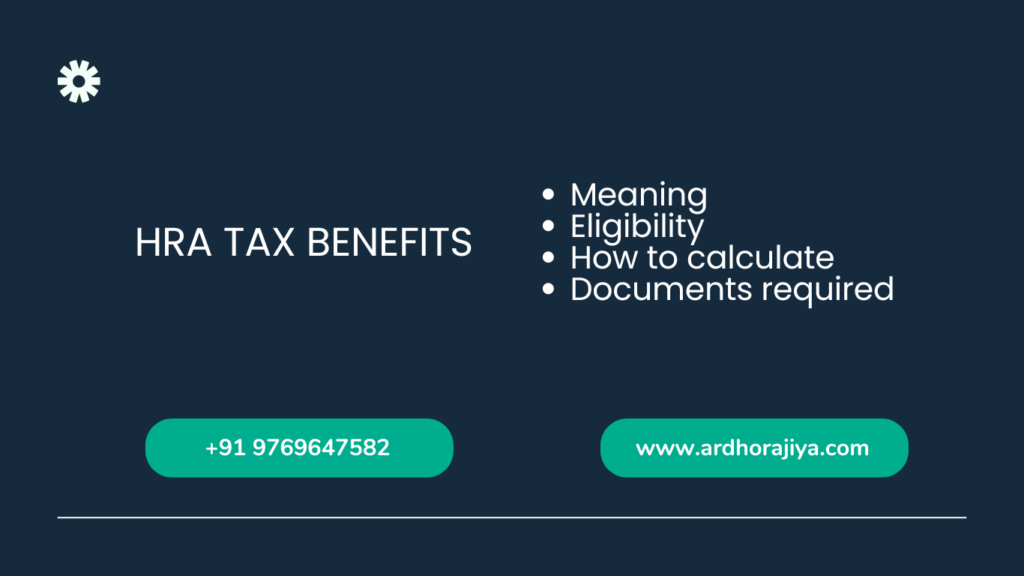
House Rent Allowance (HRA) is a significant component of the salary structure for salaried individuals in India. It serves as a key financial benefit to employees who live in rented accommodations, helping them manage their rental expenses while also providing tax benefits. In this blog, we’ll break down the essentials of HRA, its calculation, tax exemptions, and how to maximize its benefits.
What is HRA?
HRA is a specific allowance offered by employers to employees as part of their salary to cover rental housing expenses. This allowance is applicable to both government and private sector employees and is regulated by Section 10(13A) of the Income Tax Act, 1961.
HRA Eligibility Criteria
To qualify for House Rent Allowance (HRA) and its tax benefits, the following conditions must be met:
- Salaried Individual: The individual must be a salaried employee receiving HRA as part of their salary structure.
- Rented Accommodation: The employee must live in a rented house. HRA cannot be claimed for living in self-owned properties.
- Actual Rent Paid: Rent must be paid to a landlord; HRA cannot be claimed for staying in rent-free accommodations.
- PAN of Landlord: If annual rent exceeds ₹1,00,000, the landlord’s PAN must be provided.
- Valid Proof: Submission of rent receipts or a rental agreement is mandatory to claim HRA exemption.
- Residency in India: The employee must reside in the rented accommodation within India to claim HRA.
How is HRA Calculated?
The exempt portion of HRA is determined by the following factors:
- Actual HRA Received: The HRA amount paid by the employer.
- Rent Paid Minus 10% of Salary: The rent paid minus 10% of the employee’s basic salary.
- 50% or 40% of Salary: If the house is located in a metro city (Delhi, Mumbai, Kolkata, or Chennai), 50% of the salary is considered; for non-metro cities, it is 40%.
The tax-exempt amount is the lowest of these three values.
HRA Tax Exemption Example
Let’s consider an example:
- Basic Salary: ₹4,80,000 per year
- HRA Received: ₹2,40,000 per year
- Rent Paid: ₹2,16,000 per year
- Location: Non-metro city
Calculation:
- Actual HRA Received: ₹2,40,000
- Rent Paid – 10% of Salary: ₹2,16,000 – ₹48,000 = ₹1,68,000
- 40% of Salary: ₹1,92,000
The tax-exempt HRA will be the least of these, i.e., ₹1,68,000.
Documents Required to Claim HRA Exemption
To claim HRA tax exemption, employees must submit the following documents:
- Rent receipts with the landlord’s signature.
- Rental agreement (if applicable).
- Landlord’s PAN details (if annual rent exceeds ₹1,00,000).
Tips to Maximize HRA Benefits
- Plan Early: Ensure your salary structure includes HRA to avail of the tax benefit.
- Maintain Records: Keep rent receipts and agreements handy for tax filing purposes.
- Consider Family-Owned Property: If you rent from a family member, ensure a legitimate landlord-tenant relationship with rent agreement.
Common Misconceptions About HRA
- Owning a House: You can claim HRA even if you own a house in another city where you do not reside.
- No Rent Agreement: Without valid rent receipts or agreements, claiming HRA tax benefits might not be possible.
- Multiple Properties: If you pay rent for two houses, you can claim HRA for one property only.
Final Thoughts
HRA is a valuable financial and tax-saving tool for salaried individuals. By understanding its rules and regulations, you can effectively plan your finances and reduce your tax burden. Ensure you maintain proper documentation and calculate your exemptions accurately to make the most of this benefit.
For startups and MSMEs, ensuring your employees understand their salary structure, including components like HRA, can significantly improve financial planning and tax efficiency.
Need help with tax planning or salary structuring?
Get in touch with our expert CA services designed for startups and MSMEs. Let’s make tax-saving simpler and smarter for you!
FAQs
Q1. Can HRA be claimed without submitting rent receipts?
No, valid rent receipts are essential to claim HRA tax exemptions.
Q2. What happens if I don’t claim HRA?
If you don’t claim HRA, the entire amount is considered taxable income.
Q3. Is HRA applicable for self-employed individuals?
Self-employed individuals cannot claim HRA but can deduct rent expenses under Section 80GG.
All Services across Bharat
- Income tax
- GST
- Business registration
- Accounting
- Audit
- ROC filings
- Certificates
- Project report or CMA data
All Services across Bharat
- Income tax
- GST
- Business registration
- Accounting
- Audit
- ROC filings
- Certificates
- Project report or CMA data

